
Topics
Guests
- Angélique KidjoGrammy Award-winning singer and songwriter from Benin, a UNICEF Goodwill Ambassador, and the author of Spirit Rising: My Life, My Music. Her new op-ed in The New York Times is called “Don’t Let Ebola Dehumanize Africa.” She is also the co-founder of the Batonga Foundation for Girls Education. Her latest album, EVE, is dedicated to the women of Africa.
The Grammy Award-winning singer and songwriter Angélique Kidjo joins us to discuss her upcoming tribute to Miriam Makeba, the legendary South African singer and activist. “Mama Africa: A Tribute to Miriam Makeba” will be performed Wednesday at Carnegie Hall in New York City. A UNICEF Goodwill Ambassador, Kidjo is the author of the memoir, “Spirit Rising: My Life, My Music.” Her latest album, “EVE,” is dedicated to the Women of Africa.
Transcript
AMY GOODMAN: “M’Baamba,” from the last album, EVE, dedicated to the women of Africa, by Angélique Kidjo, and that’s who you heard singing. This is Democracy Now!, democracynow.org, The War and Peace Report. I’m Amy Goodman. On Wednesday, our guest, Angélique Kidjo will perform a tribute to Miriam Makeba at Carnegie Hall. I want to turn to the iconic South African singer and political activist Miriam Makeba, known popularly as “Mama Africa.” This is a clip from Makeba speaking out against apartheid in South Africa at the United Nations in 1963.
MIRIAM MAKEBA: I ask you and all the leaders of the world: Would you act differently? Would you keep silent and do nothing if you were in our place? Would you not resist if you were allowed no rights in your own country because the color of your skin is different to that of the rulers and if you were punished for even asking for equality? I appeal to you and to you, to all the countries of the world, to do everything you can to stop the coming tragedy. I appeal to you to save the lives of our leaders, to empty the prisons of all those who should never have been there.
AMY GOODMAN: Miriam Makeba, the singer, the activist, speaking at the United Nations in 1963, right about the time that Nelson Mandela would then be imprisoned, and would be imprisoned for decades. Angélique Kidjo, why are you honoring her with this concert at Carnegie Hall?
ANGÉLIQUE KIDJO: After hearing this speech, you understand why. Because both of us, we believe that we can be soldier of piece, soldier of equality, soldier of no race but one race. I mean, she has been—1963, and we are here today, and I’m asking the same thing: Don’t dehumanize Africa. Don’t ostracize the western African people. Help them. Help the health system to scale up and help their own people, because it’s just—we are one world. It doesn’t matter how we put it. Africa is the cradle of humanity. We all come from Africa. We have to stop the ones that are against peace, that are against equality, that are against loving one another, that are against our humanity.
AMY GOODMAN: In 1991, Miriam Makeba appeared on the Bill Cosby show. This is a clip.
MIRIAM MAKEBA: My image of my homeland is one of childhood memory. I look at a stream, I see myself, a native South African, flowing irresistibly over hard obstacles until they become smooth and then disappear. And those hard obstacles will disappear only when people work together.
[singing] Ngeke ngiye kwaZulu kwafel’ubaba.
HUXTABLE FAMILY: [singing] Ngeke ngiye kwaZulu kwafel’ubaba.
MIRIAM MAKEBA: [singing] Ngeke ngiye kwaZulu kwafel’ubaba.
HUXTABLE FAMILY: [singing] Ngeke ngiye kwaZulu kwafel’ubaba.
AMY GOODMAN: That was Miriam Makeba in 1991. She died in 2008. And you are honoring her here in 2014 at Carnegie Hall Wednesday night, Angélique.
ANGÉLIQUE KIDJO: She started her career in America with Harry Belafonte on that stage. The circle is completed. I mean, that voice is what get me going every morning. That smile, that strength, that silent power and fire, we all have it. Let’s unleash it for good causes, for the betterment of humanity, not for dehumanizing each other, but to love one another and live together in a peaceful world.
AMY GOODMAN: As you leave us today, can you sing something a cappella for us? Are you up to it?
ANGÉLIQUE KIDJO: Oh, we can do that, easy. Am I going to sing Miriam Makeba or one of my songs? Which one you want?
AMY GOODMAN: Whatever you choose, Miriam Makeba or your own song.
ANGÉLIQUE KIDJO: [singing Miriam Makeba’s “Laku Tshoni’langa”]
AMY GOODMAN: And what does that song mean?
ANGÉLIQUE KIDJO: It’s a lullaby, actually, that song. I love that song. And I used to tell Miriam I love this song. And she told me before, a year before she passed away, “We should do an album of lullaby. We should collect lullabies around the world and donate it to the United Nations. And when countries decide to go to war, we should play to them to remind them that every child soldier have a mother, that have been sung a lullaby to, for us to understand that if we work for peace, we get all the benefits of it.”
AMY GOODMAN: When I last saw you, at the People’s Climate March on September 21st, and you sang right there, just at 61st and Central Park West, there were a lot of cops there. And one of them was African-American. And, you know, he turned around when you started singing, because they weren’t watching you. He turned around. He took out his phone, and he started recording. And I asked him afterward. He said, “Who was that?” He said, “I had to bring this home to my wife. She’s Liberian.”
ANGÉLIQUE KIDJO: Oh, I’m so happy to hear that.
AMY GOODMAN: Well, Angélique Kidjo, Wednesday night at Carnegie Hall you’ll be honoring Mama Africa, you’ll be honoring Miriam Makeba. Thank you so much for being with us.
ANGÉLIQUE KIDJO: Thank you for having me.
AMY GOODMAN: Angélique Kidjo, singer and songwriter from Benin, a UNICEF Goodwill Ambassador and the author of Spirit Rising: My Life, My Music. Her new piece in The New York Times is called “Don’t Let Ebola Dehumanize Africa.” She’s also co-founder of the Batonga Foundation for Girls Education. Her latest album, EVE, is dedicated to the women of Africa.

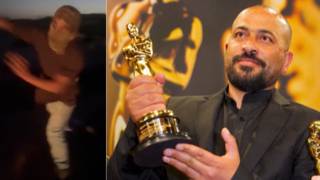
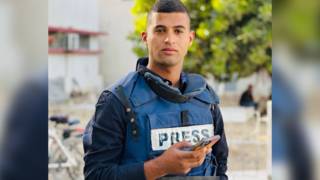
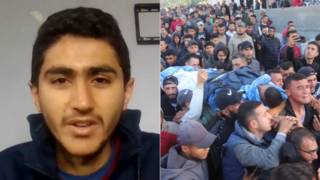
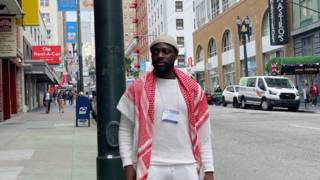






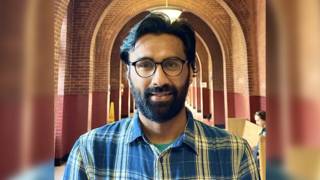
Media Options